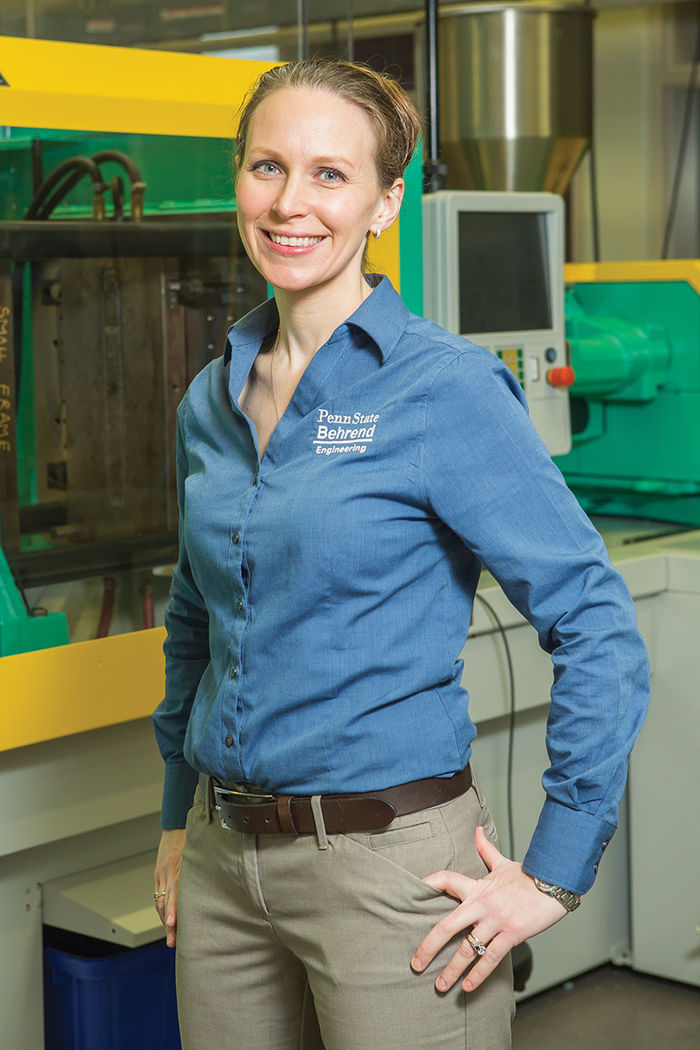Engineers are accustomed to overcoming obstacles to improve whatever process or product they are working on. In engineering disciplines, challenge equals opportunity.
The United States has a tremendous problem with the recycling of plastics, and Penn State Behrend sees an opportunity.
“When China began rejecting recycling material from the United States two years ago, it made the country acutely aware that recycling was not working,” said Dr. Alicyn Rhoades, associate professor of engineering in Plastics Engineering Technology. “We, at Behrend, have the reputation, resources, and expertise that few others have to reach both the academic world and the plastics industry to elicit change.”
Where to Start? Probably Not Where You Think.
“Currently, the perception and blame for the plastics pollution/ waste problem in the country is hitting hard against companies that make consumer or single-use plastics, such as plastic forks or food containers,” Rhoades said. “It’s this narrative that pushes policy and it’s why you’re seeing things like plastic bag bans in some countries.”
While the motivation behind such bans may appear to induce the desired effect, they may be off the mark.
“Tires are actually one of the largest sources of microplastics in the environment,” Rhoades said, “tires and also fabric that contains polymer fibers, like much spandex athletic wear, that has plastic fibers woven into it.”
“The fact is that 91 percent of plastic in the United States is not recycled,” said Dr. Sherri “Sam” Mason, Penn State Behrend’s sustainability coordinator. “There is plastic in all five of the Great Lakes, including Lake Superior, which is at the top of the lake chain, which means it’s not flowing in from the other lakes.”
But, of course, the plastics problem is complicated. Banning tires or taking compression gear off the shelves isn’t a practical solution.
“There’s no easy way to replace such a malleable and flexible material as plastic,” said Behrend’s Chancellor Dr. Ralph Ford in a recent webinar about plastics recycling. “We need to come up with novel solutions.”
Solutions Central
Enter Penn State Behrend faculty members highly experienced in plastics working with students and community partners to study the issue from start to finish. Behrend is in an excellent position to help inform future plastics development and policies. The college’s Open Lab strategy, which positions students and faculty members to engage with external partners, will create opportunities through:
- work with industry partners such as Plastek, Shell, SKF, and Berry Plastics, which provide insight into timelines, limitations, and drivers for commercial adoption of new technologies;
- an interdisciplinary effort known as the RESOLVE Lake Erie Plastics Pollution Coalition, involving research by Environmental Science and Polymer Engineering and Science faculty members and students;
- foundational curriculum in the Polymer Engineering and Science degree that focuses on science for the circular economy, including up-and-coming recycling labs and research, waste-to-energy collaborations, and compostable materials development; and
- a Penn State research and development center, led by Rhoades, known as the Advanced Resource Efficiency Center (AREC-USA), focused on technology development optimized for specific supply chain situations.
National Notice
“The college’s initiatives and partnerships in this arena are attracting world-wide attention to Penn State Behrend,” Ford said.
He is among a group of Erie leaders who advocate bringing a $100 million, 200,000-square foot plastics recycling facility to the area, and he serves as a member of International Recycling Group (IRG) Erie’s board of directors with nofinancial interest. IRG has purchased twenty-five acres of land along Erie’s lakeshore to build what company officials say will be the most technologically advanced plastics sorting facility in the world, paving the way for efficient recycling efforts.
“One of the complications in recycling plastics is that there are thousands of types of plastic,” Rhoades said. “Developing a better, more efficient way to sort it is key to fixing the breakdown in the recycling loop. IRG is using some innovative techniques and we’ve been able to help them consider aspects of that separation science.”
Next Steps
Looking ahead, Rhoades has three immediate goals for the college’s plastics initiatives: to launch a Sustainable Plastics Center of Excellence; to develop a Circular Economy of Plastics Advisory Board of representatives from across the supply chain and disciplines; and to support regional business development, including technology advancement and supply chain optimization, through AREC-USA.
“We want to take a more holistic approach and consider the entire life of the item or product we are developing,” Rhoades said. “Should we switch to bio-based plastics products? Maybe. But the supply chain is not in place for that yet. That’s something to work on. When it comes to recycling, what are the bottlenecks? Where are the opportunities for efficiency gains and what is actually recoverable? There are a lot of ways we can make improvements, but we need to do our homework (research) first.”
